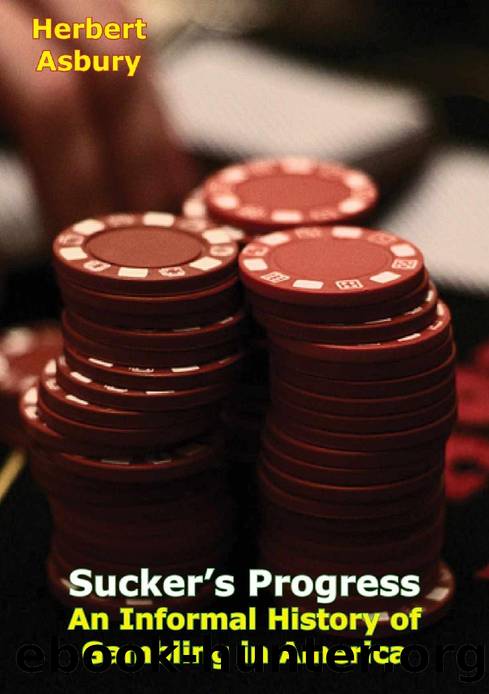Sucker’s Progress: An Informal History of Gambling in America by Herbert Asbury

Author:Herbert Asbury [Asbury, Herbert]
Language: eng
Format: epub
Publisher: Hauraki Publishing
Published: 2016-10-21T04:00:00+00:00
In all probability Colonel Bryant would not have been molested had he remained in Vicksburg, but he didn’t dare put friendship to such a test, and was one of the first to leave when the gamblers were ordered out of the town. During the next few years the Colonel traveled in Alabama and Louisiana, winning a great deal of money at short cards and losing most of it at Faro and Monte, which was just beginning to be popular in that part of the country. In 1839, at Huntsville, Ala., the Colonel had a memorable short card session with Allen Jones, a prosperous saddler and a Poker player of considerable local renown. Bryant let Jones play along until he had pledged his business and every cent he owned, and then dealt the saddler four kings and himself four aces. Jones was so impressed by the ease with which he had been trimmed that he implored the Colonel to teach him the tricks of the trade, the upshot being that the two men became partners. For the next ten years they were inseparable companions living on a common purse. They spent the summers at the fashionable watering-places of the South, and the winters at New Orleans and Mobile, and at Jackson, Miss., where they operated a Faro bank and Poker house during the sessions of the Mississippi Legislature.
Colonel Bryant dissolved the partnership in the fall of 1849 and went to San Francisco, where within a few weeks he won $75,000 playing Monte. He sent a third of this fortune to his wife in Mississippi, and with the remainder bought a hotel called the Ward House, which he renamed the Bryant House. Under the Colonel’s management the Bryant House was more a gambling-joint than a hotel, but it produced a large revenue, which the Colonel spent freely to further his political ambitions. When he was nominated for Sheriff of San Francisco in 1850 the Bryant House was literally covered with flags and bunting, free drinks were served at the bar to all comers, and the Colonel made a speech from the balcony every few hours. On election day the Bryant forces paraded Portsmouth Square with signs and banners, companies of gaudily-clad horsemen, and bands of music in carriages. But the independent candidate, Colonel Jack Hayes, was an even better showman than Colonel Bryant. Unable to equal the latter’s display, he appeared in the Square alone, astride a magnificent black stallion, and wearing the uniform in which he had won fame during the War with Mexico. The voters promptly abandoned Bryant’s circus for the stern warrior, and elected Colonel Hayes by a large majority.
The embittered Colonel Bryant sold his hotel soon after the collapse of his political career, and was preparing to seek greener pastures when he was offered a third interest in one of the Faro banks at El Dorado, early San Francisco’s most celebrated gambling house. He was supposed to rope for the game and give it the benefit of his effulgent presence.
Download
This site does not store any files on its server. We only index and link to content provided by other sites. Please contact the content providers to delete copyright contents if any and email us, we'll remove relevant links or contents immediately.
| Espionage | Hoaxes & Deceptions |
| Murder & Mayhem | Organized Crime |
| Serial Killers | White Collar Crime |
Mindhunter: Inside the FBI's Elite Serial Crime Unit by John E. Douglas & Mark Olshaker(7827)
Wiseguy by Nicholas Pileggi(4581)
Hitman by Howie Carr(4373)
Room 212 by Kate Stewart(4099)
Secrecy World by Jake Bernstein(3773)
Breaking Free by Rachel Jeffs(3618)
Killers of the Flower Moon: The Osage Murders and the Birth of the FBI by David Grann(3604)
Papillon (English) by Henri Charrière(3263)
Killers of the Flower Moon by David Grann(3228)
Say Nothing by Patrick Radden Keefe(3053)
The Secret Barrister by The Secret Barrister(3004)
American Kingpin by Nick Bilton(2966)
Molly's Game: From Hollywood's Elite to Wall Street's Billionaire Boys Club, My High-Stakes Adventure in the World of Underground Poker by Molly Bloom(2962)
Mysteries by Colin Wilson(2883)
In Cold Blood by Truman Capote(2677)
I'll Be Gone in the Dark by Michelle McNamara(2555)
Signature in the Cell: DNA and the Evidence for Intelligent Design by Stephen C. Meyer(2496)
Rogue Trader by Leeson Nick(2469)
Bunk by Kevin Young(2461)
